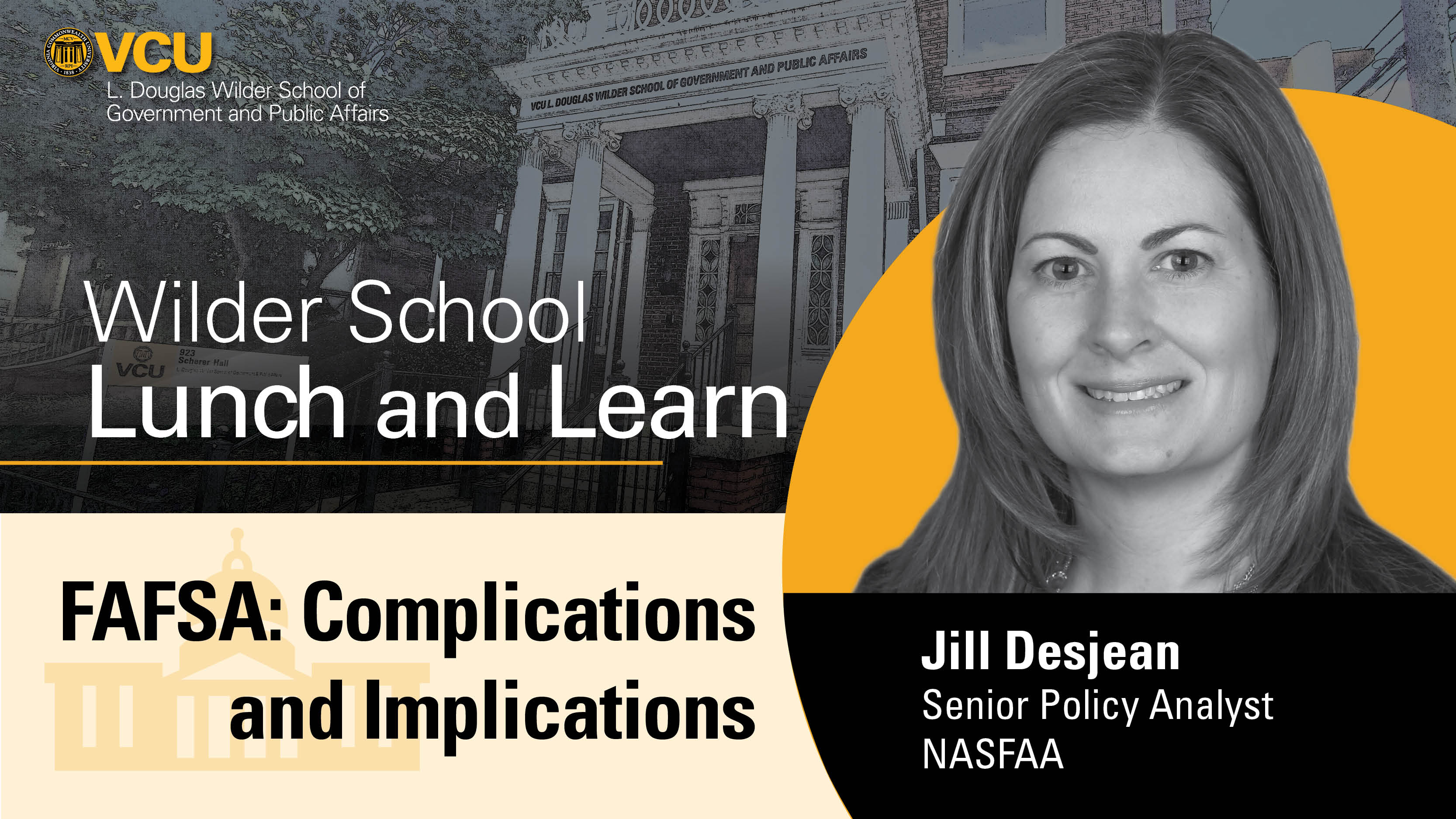News
Financial aid expert Jill Desjean explains the consequences and challenges of Free Application for Federal Student Aid (FAFSA) changes

by David Slipher
What are the ripple effects of recent changes to the Free Application for Federal Student Aid (FAFSA) program? How are these challenges affecting students, families and educational institutions?
Jill Desjean, a senior policy analyst at the National Association of Student Financial Aid Administrators, shared her expertise during a recent Wilder School Lunch and Learn virtual presentation entitled: “FAFSA: Complications and Implications.” The Free Application for Federal Student Aid process is the entry point to post secondary federal student financial aid funding distributions.
Desjean explored the complexities of FAFSA changes, based on her comprehensive report for The Brookings Institution, “The Complication with FAFSA Simplification.” Her analysis highlights the unintended complications that are arising from efforts to streamline the process, and offers a critical perspective on the impacts these changes might have.
>>View the complete video presentation on YouTube
"When it works, it is beautiful when people who filled out a FAFSA last year fill it out this year and it works. They say that was a breeze. ‘I can't believe how easy it was. I can't believe how little time it took me.’"
- Jill Desjean
In her role, Desjean manages the policy analysis team, interpreting Federal student aid legislation and regulations for NASFA members and works to develop policy recommendations and provides feedback to policymakers on legislative and regulatory proposals.
“You're all here because you know that college opens doors to opportunities,” Desjean said. “But the price tag can put a college education out of reach for many Americans.”
Desjean explained that the current changes to FAFSA comprise components from three pieces of legislation passed since 2019. These changes allow sharing of federal taxpayer information with the Department of Education for purposes of applying for financial aid as well as for applying for income based student loan repayment. The goal of the rollout was to significantly shorten the Fafsa by removing all the income questions, complicated information not readily available to applicants or their parents.
Another change included expanding Federal Pell grant eligibility to students enrolled in prison education programs. Other changes, such as adjusting threshold levels of financial support, additional aid for families owning small businesses and more have also been implemented.
“So now that full implementation has taken place, we're expecting to see greater eligibility need for financial aid and hopefully, correspondingly extra financial aid to fill that need for students,” Desjean said.
Despite the overhaul of the FAFSA process, the actual rollout has been more of a logjam. Desjean sees the delayed release of the new process, which was nearly a year behind existing school financial aid calendars, as a major concern that has definitely harmed the college decision making process. Many applications have yet to be processed by the Department of Education, she explained. It's a challenge that is constraining university admissions decisions, which has created strains on student enrollment, admissions and retention.
“Any student who filled out a paper form has not been told by their school how much they're eligible for,” shared Desjean. “And we're in mid July, and for many students they would be looking to start school in a month, six weeks … Schools only have limited ability right now to make corrections.”
A recent report from the VCU Wilder School Research Institute for Social Equity, entitled, “Equity Challenges And Opportunities In The Revised FAFSA,” found that the challenges in securing financial aid through FAFSA disproportionately impacts minority students, low income students and women, who are already more likely to apply for financial aid.
During the virtual presentation, Desjean also fielded audience questions along with presentation moderator, Hernan Bucheli, vice president for strategic enrollment management and student success at VCU.
All program rollout challenges considered, there is a light at the end of the tunnel. Desjean notes that the new process is undoubtedly simpler and easier to complete.
“The message that hasn't been getting across is that actually, the form is significantly better. All of those changes that Congress intended with this data is coming directly from the IRS. When it works, it is beautiful when people who filled out a FAFSA last year fill it out this year and it works. They say that was a breeze. ‘I can't believe how easy it was. I can't believe how little time it took me.’"